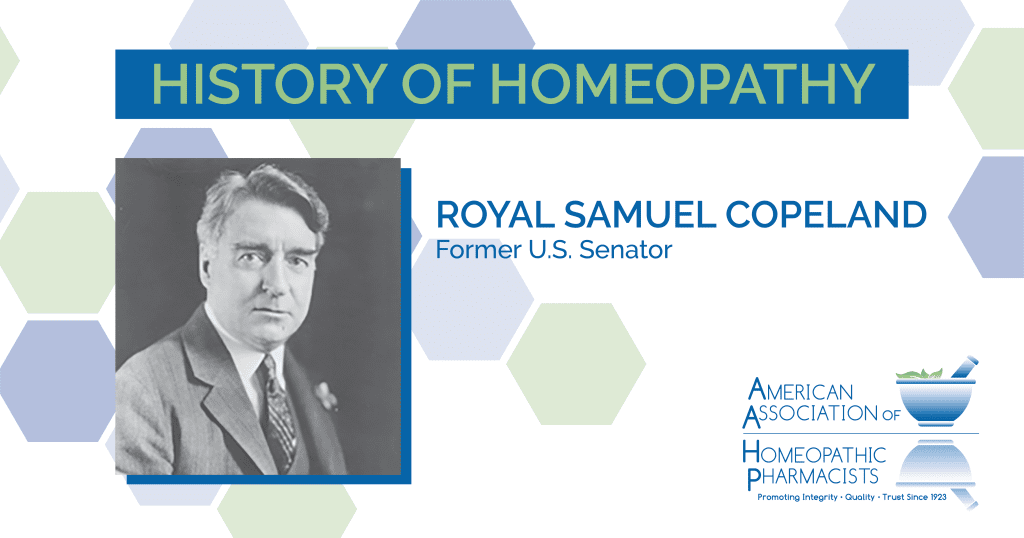Royal S. Copeland: We Know The Name – But Do We Know The Man?

By Eric Foxman, AAHP Secretary, Pharm. (Ret.)
The homeopathic community is likely familiar with the name of the framer of the U.S. Food, Drug and Cosmetic Act, and the value he placed on homeopathic drug products — to the extent he ensured the HPUS was included in the Act itself. But there is far more to this interesting man than one solitary fact.
Royal Samuel Copeland was born in Michigan, where he attended school and graduated from the University of Michigan with a degree in medicine. He continued his graduate studies in Europe and returned to his home state where he began to practice medicine. Copeland became a member of the Homeopathy Society of Michigan in 1890 and held various offices, including president and secretary beginning in 1893. Additionally, he served as a professor of ophthalmology and otology in the University of Michigan Medical School's Homeopathic Department from 1895 until 1908.
Active in municipal politics, Copeland, a Republican at the time, served as mayor of Ann Arbor from 1901 to 1903. He subsequently served as president of the local Board of Education and the Board of Park Commissioners.
In 1908, Copeland moved to New York City to become dean at the New York Homeopathic Medical College and Flower Hospital, where he served for a decade until appointed as president of the New York City Board of Health in May 1918. In September, Copeland acknowledged the Spanish flu outbreak was seriously impacting the city and was possibly an epidemic. He decided to permit motion picture theaters to remain open as he felt closing them would have little impact, so long as crowded transportation lines continued to run. He did not close the city's schools, stating it was better, “to have the children under the constant observation of qualified persons than to close the schools.” Most importantly, during the epidemic, Copeland organized a system of emergency health districts to provide localized care close to where residents lived.
Because of his attempts to reassure a frightened public, Copeland received considerable press coverage. He served five terms as president of the New York City Board of Health, before successfully running (as a Democrat) for United States Senator from New York State in 1922; the earlier positive publicity was a great aid during his campaign. He was reelected in 1928 and 1934. In those three Senate terms, Copeland was chair of the Senate Committee on Rules and Administration and chair of the Committee on Commerce.
We are all aware of Senator Copeland as the primary author and sponsor of the Federal Food, Drug, and Cosmetic Act of 1938. He was also the primary sponsor of the Copeland “Anti-Kickback” Act, which targeted kickbacks to federal contractors, subcontractors, and officials from construction employees. This legislation did not endear him to the Democratic party organization back in New York City. Copeland proposed two amendments to the Interstate Commerce Act; these would have added an anti-lynching bill to the Act, but both failed to pass due to a majority of Senate Democrats from southern states voting to table them.
Copeland was also known for his successful efforts to bring air conditioning to the Senate. From his medical background, he complained about anything he believed would be unhealthy in the Senate’s environment. He often said the quality of the air in the Senate was largely responsible for hastening the deaths of some 34 senators during a 12-year period. He sponsored a resolution for the improvement of “living conditions in the Senate chamber,” and became deeply involved in a proposal to ventilate the Senate. By 1929, the Senate was enjoying its first air conditioning system due to Copeland’s focus on improving the senators’ working conditions.
Against this backdrop, it is ironic that he was the physician who so often warned his fellow senators about the ill effects of overwork and stress; this same doctor seemed to have not heeded his own medical advice. In 1938, he apparently pushed himself to the point of compromising his own health as he successfully shepherded the Food Drug and Cosmetic Act through Congress. Four days after the successful passage of the Act, Senator Royal Copeland died of what newspapers reported as a “sudden general circulatory collapse,” complicated by a “kidney ailment.”
During his life, Royal Copeland served as president, vice president, and secretary of the Michigan Homeopathic Society; president of the American Institute of Homeopathy; vice president of the American Public Health Association; president of the American Ophthalmological, Otological, and Laryngological Society; a member of the Tuberculosis Commission of Michigan; and as a trustee of Michigan State Tuberculosis Sanitarium. He was also a member of several honor societies and fraternal organizations, including the Pi Gamma Mu international honor society in social sciences.
Dr. Copeland authored a number of published papers including:
- Copeland (September 1904). In defense of the attenuated drug. Medical Century. 12 (9): 257–264.
- Copeland, Royal S. (May 1909). The scientific reasonableness of homoeopathy. New York. hdl:2027/mdp.39015071593936.
- Royal S. Copeland (1935). Doctor Copeland's home medical book. Philadelphia: John C. Winston. OCLC4758731.
References:
https://en.wikipedia.org/wiki/Royal_S._Copeland, accessed Oct. 10, 2022.
https://www.knoxfocus.com/archives/this-weeks-focus/doctor-senate-royal-s-copeland-new-york/, accessed Oct. 10, 2022.
https://snaccooperative.org/ark:/99166/w6ff44gs, accessed Oct. 10, 2022.
